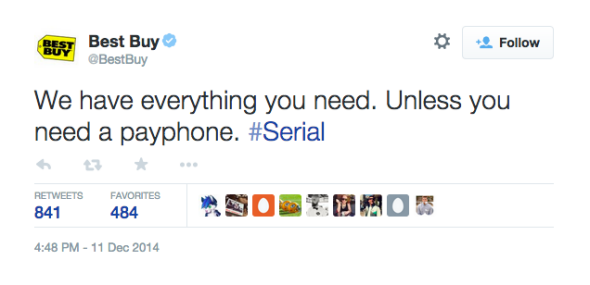So tweeted Best Buy a bit before 4 p.m. Eastern time on Thursday, to the simultaneous delight and outrage of the Internet. (While I was writing this post, the tweet was taken down, and Best Buy issued an apology.) In case you haven’t been listening to Serial, the hit spinoff of This American Life about the murder of teenager Hae Min Lee, that joke is somewhat funny because a pay phone in the parking lot of a Maryland Best Buy plays a crucial role in the state’s case against its suspect. According to the state, Adnan Syed placed a call for a ride to a friend from that pay phone shortly after he allegedly murdered Lee. The question Serial has been trying to answer: Is there evidence that pay phone existed?
You see Best Buy’s joke—it can offer everything you need, except a pay phone. Serial’s massive popularity, according to a story published Wednesday in the Huffington Post, has apparently turned the site of that question into something of a fan/tourist destination. “So many people have inquired about the phone that the general manager of the store, who hadn’t heard of Serial until people started coming in to ask about it, has started listening,” the Huffington Post reports. Clearly Best Buy has already been getting increased attention from the podcast. So why has its decision to capitalize on that attention spurred a wave of Internet outrage?
The short answer is that corporate jokes about Serial rub people wrong. Serial, after all, is a podcast about a real murder, and a subject that sensitive is generally not great fodder for a marketing push. People don’t like to think of companies as exploiting someone’s death for their own gain. On the other hand, Best Buy is not the first company or brand to attempt this kind of marketing spin. In late November, Cheerios decided to make the cereal/Serial joke on Twitter, tweeting, “Discovering the truth can be tough when you’re hungry.” (That tweet has also since been taken down.) This week, Sesame Street tweeted in anticipation of Serial’s next episode: “Is it Thursday yet? Bert is so excited for his Thursday morning CEREAL.”
Why is it OK for Sesame Street—a children’s show, for goodness’ sake—to make this kind of jest, but not Best Buy? Well, even though Sesame Street is a business, it’s also a nonprofit with plenty of accrued good faith and a long history of engaging in cultural commentary. Best Buy is a big company that sells electronics and exists to make money. So: When Sesame Street makes this sort of joke it has a pass for creative license and snark that Best Buy just doesn’t get. It probably doesn’t matter what Best Buy says about Serial. As long as it appears to be using an element of the show for its own monetary gain, people are bound to get annoyed.
Whether this attitude is fair is a potentially endless discussion, but I’d suggest that it’s not. Here’s why. Yes, it’s true that Serial is a journalistic enterprise about a real, serious event. It’s also true that, on some level, it feels wrong for a brand to exploit that. But at this point in the series, Serial is much more than a journalism project. It is a cultural phenomenon. The show’s episodes have been downloaded and streamed more than 5 million times.* Thousands are parsing the details of its case on Reddit. People aren’t just listening to Serial because it’s important and weighty and informative—they’re listening to Serial because it’s entertaining. I think we all agree that pop culture and entertainment are fair game for brands to market on. If we accept that Serial has crossed into that territory, it seems hypocritical to treat it as strictly off-limits.
*Correction, Dec. 15, 2014: This post originally misstated that 5 million people have downloaded and streamed episodes of Serial. The show has multiple episodes, which have been downloaded and streamed more than 5 million times combined.
